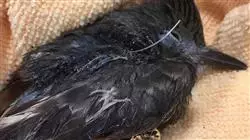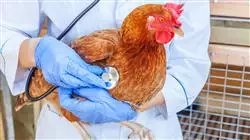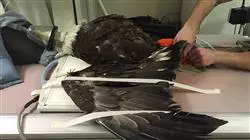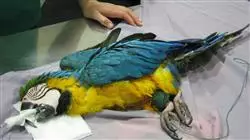University certificate
The world's largest faculty of veterinary medicine”
Description
Our complete postgraduate diploma will allow you to develop your skills in avian management to cure the diseases these patients present”

The postgraduate diploma in Detecting Disease in Avian Patients has been designed by professionals with years of experience and extensive training in the field, who have decided to contribute all their knowledge to complement the training of other professionals. Students will thus notice an improvement both in their professionalism and in the number of specialized centers that successfully treat avian patients as a result.
This academic program emphasizes the importance of examining the evidence from scientific research, applied to veterinary practice in birds, since clinical examination and anamnesis often provide little diagnostic data. Unfortunately, treatments are administered before sufficient evidence has been collected to reach a proper diagnosos, often because the symptoms worsen or the owner has a limited budget. That is why this new and updated postgraduate diploma focuses the coursework on establishing diagnoses based on scientific evidence while optimizing the economic resources and the time spent to find early treatment.
When a bird comes to a clinic, veterinarians must perform a series of tests according to the symptoms present. One of the mandatory guidelines is the routine coprological analysis, but, depending on each case, veterinarians will also have to perform radiographies, ultrasound scans, analysis or endoscopies, for example, in order to reach the most accurate diagnoses. Like other animals, birds are susceptible to a wide variety of diseases. This program focuses on the different diseases that can affect avian patients, giving veterinarians the keys to treat them properly.
In short, this training provides students with specific tools and skills to successfully develop their professional activity in the wide field of avian medicine and surgery. It addresses key competencies such as knowledge of the reality and daily practice of veterinary professionals, develops responsibility in the monitoring and supervision of their work, as well as communication skills within the essential teamwork.
As it is an online postgraduate diploma, students are not constrained by fixed timetables or the need to commute to a physical location, but can access the contents at any time of the day, balancing their work or personal life with their academic life.
Do not miss the opportunity to study this postgraduate diploma with us. It's the perfect opportunity to advance your career"
This postgraduate diploma in Detecting Disease in Avian Patients contains the most complete and up to date academic program on the market. The most important features of the program include:
- Practical cases presented by experts in avian medicine
- The graphic, schematic, and eminently practical contents with which they are created, provide scientific and practical information on the disciplines that are essential for professional practice
- Latest developents in avian patient diseases
- Practical exercises where the self assessment process can be carried out to improve learning
- Special emphasis on innovative methodologies in avian medicine
- Theoretical lessons, questions to the expert, debate forums on controversial topics, and individual reflection assignments
- Content that is accessible from any fixed or portable device with an Internet connection
This postgraduate diploma is the best investment you can make when choosing a refresher program to expand your existing knowledge of the subject matter”
Its teaching staff includes professionals from the veterinary field, who bring the experience of their work to this training, as well as recognised specialists from leading societies and prestigious universities.
The multimedia content, developed with the latest educational technology, will provide the professional with situated and contextual learning, i.e., a simulated environment that will provide immersive training programmed to train in real situations.
This program is designed around Problem Based Learning, whereby the specialist must try to solve the different professional practice situations that arise during the academic year. For this purpose, the professional will be assisted by an innovative, interactive video system created by renowned and experienced experts in avian patient diseases with extensive experience.
This training comes with the best didactic material, providing you with a contextual approach that will facilitate your learning"

This 100% online postgraduate diploma will allow you to balance your studies with your professional work while expanding your knowledge in the field"
Objectives
The postgraduate diploma in Detecting Disease in Avian Patients is designed to facilitate professional veterinary practice with the latest advances and most innovative procedures in the sector.

This is the best option to learn about the latest advances in bird medicine and surgery”
General Objectives
- Compile the most commonly used diagnostic techniques: radiology, endoscopy and ultrasound
- Develop specialized knowledge in all laboratory diagnostic tests
- Establish the protocols to interrupt biochemical analysis and proteinograms
- Demonstrate the correct necropsy technique in avian patients
- Generate protocols for coprology in birds
- Examine radiology techniques in avian patients
- Anticipate diagnostic difficulties in ultrasound in avian patients
- Propose endoscopy as the diagnostic technique of choice
- Analyze the main infectious pathologies in birds: Viral, bacterial, mycoplasmic, fungal and parasitic
- Develop specialized knowledge of non-infectious pathologies: genetic, metabolic-endocrine, anatomical alterations, physical chemical imbalances and nutritional deficiencies
- Define soft tissue pathologies
- Specify treatments and prevention strategies
- Develop specialized knowledge of diseases in birds according to cause, epizootiology and physiopathogenesis
- Determine the close relationship between humans and wild birds
- Identify the routes of disease transmission
- Analyze the most frequent questions that arise in field situations
Specific Objectives
Module 1. Laboratory Tests
- Analyze diagnostic evidence, information gathering methods, sample preparation for referral and transport purposes to anatomic pathology laboratories
- Examine hematology in birds with the different morphological changes they present
- Identify the results of biochemical analyses in birds
- Develop the latest cytological techniques
- Demonstrate the correct technique for sending samples to anatomic pathology services
- Examine the external and internal lesions that birds may present in the postmortem technique and their diagnostic interpretation
- Obtain the necessary samples from the postmortem examination for study by histopathology, microbiology and polymerase chain reaction (PCR)
Module 2. Diagnostic Imaging Techniques
- Specify the sedation and anesthesia techniques necessary to perform diagnostic imaging techniques
- Study existing radiology equipment and diagnostic options in birds
- Develop management techniques for proper patient positioning, including the most commonly used projections in daily clinical practice
- Analyze the anatomical references in radiography, ultrasound and endoscopy to reach reliable diagnoses
- Justify why a specific type of ultrasound probe is used in avian patients
- Analyze the endoscopy techniques and applications in birds
- Achieve the maximum knowledge in other really important diagnostic techniques such as routine coprological analysis
Module 3. Management Related Pathologies
- Identify symptoms to be able to detect them in time and act as soon as possible
- Examine the main pathologies derived caused by incorrect handling to avoid them and even prevent death
- Analyze the most frequent emergencies derived from incorrect handling, such as lead poisoning and capture myopathy
- Specify oral cavity disorders and their most appropriate treatments.
- Completely and successfully deal with all the pathologies affecting the crop, the proventriculus and the ventriculus
- Delve deeper into all the most common pathologies affecting the distal part of the intestine
- Analyze liver disorders due to external causes, as well as the typical pathologies they present
- Develop specialized knowledge of the great avian unknown: The endocrine system, analyzing each of the endocrine glands in birds and their physiopathogenesis
Module 4. Avian Patient Diseases
- Identify the cause of the disease through causal agents
- Develop specialized knowledge of the most common diseases in wild birds
- Make the best use of a list of problems, together with their differential diagnoses to properly design work plans
- Develop the most important viral diseases in wild bird pathologies, understanding that they are the most serious
- Diagnose diseases caused by bacteria, since they are mostly linked to respiratory infections, blood infections, intestinal infections or a combination of any of them
- Analyze parasitic diseases, their symptomatology and the most updated treatments

A unique specialization program that will allow you to acquire advanced training in this field"
Postgraduate Diploma in Detection of Diseases in Avian Patients
Knowing how to detect the diseases suffered by avian patients is essential for veterinarians specialized in these animals, since it will increase their life expectancy. However, information in this field is not abundant, so sometimes professionals are faced with a lack of educational opportunities. TECH wants to solve these problems by providing students with the best Postgraduate Diploma on the market in avian patient disease detection. TECH Global University presents the Postgraduate Diploma in Avian Patient Disease Detection. It is a valuable academic option for those professionals who wish to specialize in poultry health. This academic program aims to provide knowledge and tools necessary for the diagnosis, treatment and prevention of diseases in birds. During the Postgraduate Diploma in Avian Patient Disease Detection, students will acquire skills in poultry handling, disease diagnosis, clinical pathology, mycological diagnosis and therapeutic treatment, among other topics related to avian health.
Master new knowledge through distance learning
This program is taught in online mode, which allows students to adapt their study time to their convenience and work independently. The teaching method is based on case studies and personalized tutoring by professional experts in the field of avian health. Participants will also find a wide variety of resources such as multimedia pills, online library and specialized reading guides. In conclusion, the Postgraduate Diploma in Avian Patient Disease Detection is a highly specialized academic program in demand in the labor market, which provides the necessary tools for the diagnosis, treatment and prevention of poultry diseases. Students acquire practical and theoretical skills to apply in different work environments, contributing significantly to improve the health of birds and the quality of life of the people who depend on them.







